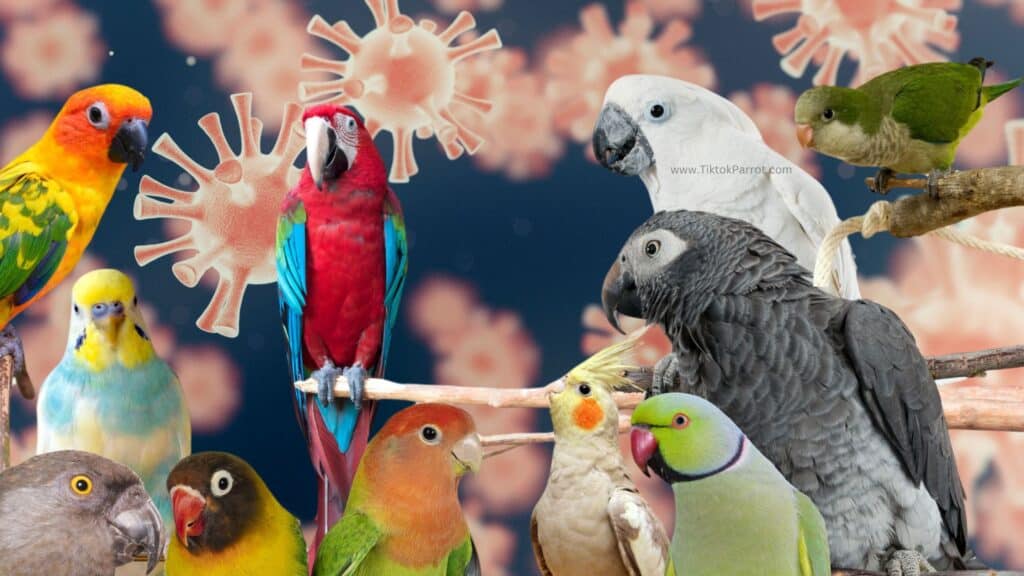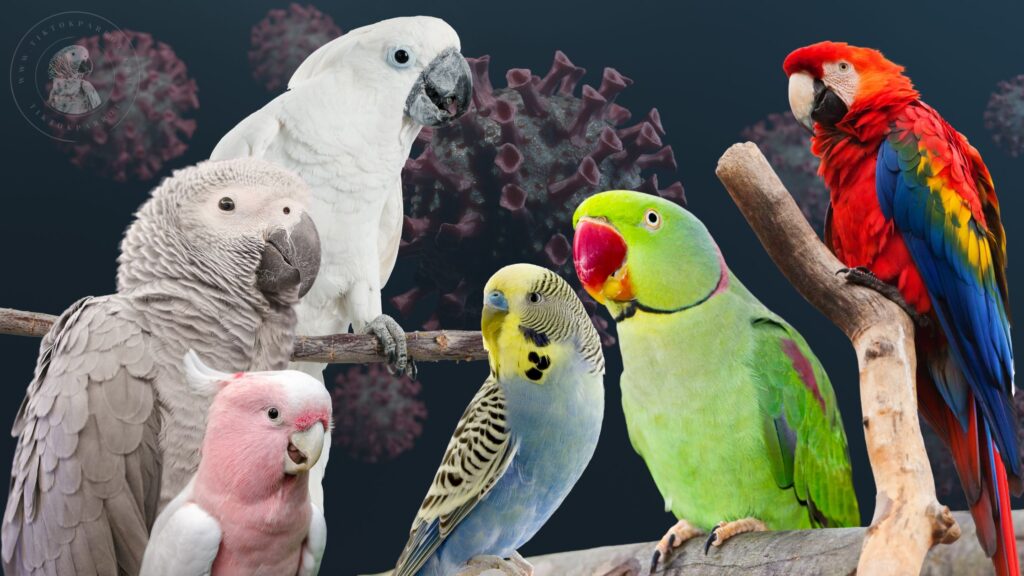Your Feathered Friend Feeling Funky? Cracking the Code on Polyomavirus in Birds
Today, we’re tackling a topic that might sound like a villain from a superhero movie: polyomavirus in birds. Don’t let the fancy name scare you – we’re here to shed some light on this silent spreader and keep your feathered friend healthy and happy.
Is your baby bird acting sick? Polyomavirus spreads quickly in young birds & can be deadly. Learn signs, prevention & how to keep your feathered family safe!
Polyomavirus – it sounds like something straight out of a sci-fi flick, right? But fear not, knowledge is power! In simpler terms, it’s a sneaky little virus that can cause big problems for young birds, especially those still under your wing (literally!). While adult birds can carry the virus without showing any signs, for chicks, it can be quite serious.
So, How Does This Tiny Terror Get Into My Bird’s Nest?

Picture your parrot as a curious little explorer, constantly pecking at everything in sight. Unfortunately, this adventurous spirit can sometimes lead them down a path filled with unwanted guests. Here are the usual suspects when it comes to polyomavirus:
- Contaminated Food and Water: Spoiled or dirty food and water are breeding grounds for nasty viruses. Think of it as a stale cracker gone rogue, not something you’d want your baby bird munching on!
- Direct Contact with Infected Birds: Birds can carry the virus without showing any symptoms. A seemingly harmless cuddle with a sick friend at the park could be all it takes for your chick to catch this sneaky virus.
- Contaminated Environment: A dirty cage or play area can harbor the virus. Imagine your chick’s nursery turning into a germ jungle – yikes!
Is polyomavirus a threat to caged birds?
Yes, Polyomavirus poses a significant threat to caged birds, especially young ones between 14-56 days old. It’s highly infectious and can lead to severe symptoms and even death, making it a serious concern for bird owners and breeders alike.
Remember, polyomavirus can be deadly, as I mentioned above especially for young birds. It can cause severe symptoms such as swollen abdomen, depression, loss of appetite, weight loss, diarrhea, and even sudden death. While adult birds may develop some level of immunity, Polyomavirus remains a significant threat to the health of both young and adult birds.
polyomavirus vaccine for birds cost
The cost of the polyomavirus vaccine for birds can vary depending on factors such as the type of bird, the veterinarian or clinic administering the vaccine, and the region where you live. Generally, the cost ranges from $20 to $50 per dose. However, it’s essential to consult with your avian veterinarian to get an accurate estimate based on your bird’s specific needs and circumstances.
Here are some suggestions to find the exact cost:
- Contact your local veterinarian: They can provide the most accurate price for the vaccine in your area and for the specific bird you have.
- Search online pet stores: Some online pet stores sell the vaccine, though it’s important to confirm it requires administration by a veterinarian.
Is polyomavirus contagious?
Definitely, yes, polyomavirus is contagious among birds. It can spread from one bird to another through various means, including feather dust, feces, aerosols, parental feeding of chicks, direct contact, or contact with infected environments such as incubators or nest boxes. Additionally, infected birds that show no obvious signs of illness can still transmit the virus to other birds, making it a significant concern for aviaries and bird owners.
Polyomavirus can affect most, if not all, species of parrots. It is considered a significant threat to cage birds worldwide and is particularly problematic among neonates (young birds) aged between 14 and 56 days. While parrots are most commonly affected, other bird species can also contract polyomavirus if they come into contact with the virus.
Uh Oh, My Chick Seems Off-Color! What Are the Signs?
Unlike a grumpy teenager slamming their door, chicks can’t exactly tell you they’re feeling under the weather. Here’s what to watch out for:
- Lethargy: Is your usually energetic chick napping more than usual? This lack of energy can be a sign of illness.
- Loss of Appetite: Imagine your chick turning up their little beak at their favorite formula or mush – that’s a red flag! A healthy chick should be gobbling down food like a tiny feathered champion.
- Difficulty Breathing: In severe cases, chicks with polyomavirus might struggle to breathe. Picture your little one gasping for air – definitely a cause for concern!
- Feather Problems: Chicks with polyomavirus might develop abnormal feather growth or even lose feathers altogether. Imagine your chick looking more like a fuzzy mess than a cute little feathered ball – not a good look!
Don’t Panic! How Can I Help My Little Chick?

If you suspect your chick has polyomavirus, the first step is to seek professional help. A qualified veterinarian can diagnose the problem and recommend the best course of treatment. Unfortunately, there’s no magic cure for polyomavirus, but supportive care can help your chick feel better.
Prevention is Key: Keeping Your Feathered Family Safe!
Now, let’s talk about building a shield around your feathered family’s health! Here are some simple steps you can take:
- Fresh Food and Water Daily: This is birdie basic hygiene! Freshness is key to keeping nasty viruses at bay.
- Cleanliness is Next to Godliness: Regularly clean your parrot’s cage, toys, and food and water dishes with a disinfectant solution safe for birds. Imagine giving your parrot’s play area a spa day – they’ll appreciate it, even if they can’t quite tell you!
- Separate New Birds: If you’re introducing a new feathered friend to your flock, quarantine them first to ensure they’re healthy. Think of it as a new student getting a check-up before joining the birdie classroom!
- Regular Vet Checkups: Schedule regular checkups with your avian vet to keep your feathered family healthy. Think of it as a yearly tune-up to keep your whole flock in tip-top shape!
The Final Tweet (or Chirp!)
Polyomavirus might sound scary, but by being informed and taking preventive measures, you can keep your feathered family healthy and happy. Remember, early detection and veterinary care are crucial if your chick does get sick.
Let’s Flock Together!
Have you ever dealt with polyomavirus in your birds? Share your experiences, tips, and questions in the comments below. Together, we can create a healthy and happy environment for all our feathered friends!
If you found this blog helpful, It would be great if you could share it with your family and friends who might find it useful as well.
You might like to read these as well 🙂
Understanding Pacheco’s Disease Symptoms, Transmission and Prevention
Mystery of African Grey Parrot Proventricular Dilatation Disease (PDD)
From Beaks to Bellies: Understanding African Grey Parrot Vomiting
Psittacine Beak and Feather Disease (PBFD) In Pet Birds
What diseases can African Grey parrots get?
What causes death in African Grey Parrots?
For more useful content about African grey parrots, you can subscribe my site with your email to get notification upon publishing a new blog, the subscribe box you can see on the right side of this page. Also if you get an alert on your web browser while browsing my site, allow it and that will also give you an alert whenever I publish a new blog. 🙂
Stay safe and much love!



